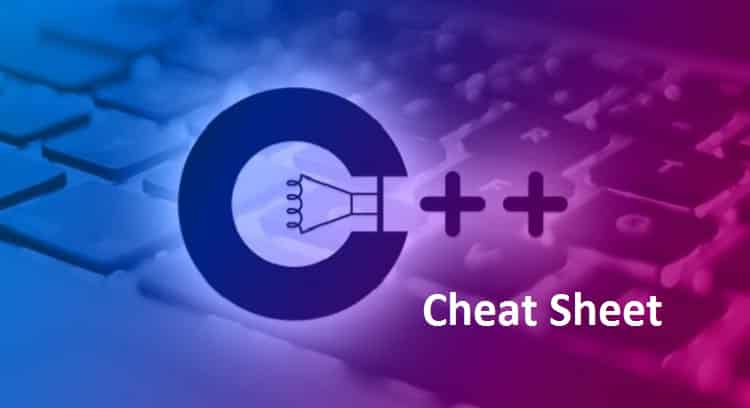C++ is a general-purpose programming language which has a lot of functionality. It is the object-oriented programming language with extensive features, and it also provides low-level memory manipulation. It is a programming language through which the programmer can easily design the embedded system, large system and resource constrained by high performance, efficiency, flexibility, and design highlights. For each OS there are different C++ compilers, and it is the universal programming language, so it is available in every microcomputer. The different compiler of OS is helpful for editing, compiling, and debugging. C++ programming language is easier when you know the proper expression, declaration, and operators to perform calculations. The following cheat sheet gives you ultimate guidance regarding C++ programming language. Whichever service is in high demand, you can get freelance services for the same.
Data Types:
The data type is a type of data which describe a collection of values with a different operation. It has following three types of categories such as simple data types, structured data types, and pointers.
- Integral Data Types
- Char
- Short
- int
- long
- bool
- Unsigned char
- Unsigned long
- Unsigned short
- Unsigned int
- Floating-Point Data Types
- Float
- Double
- Long double
Standard Library in C++
There are two types of standard library in C++.
The Standard Function Library: This library covers the general purpose, standalone functions that are not part of any class and function library inherited from C.
The Object-Oriented Class Library: The object-oriented class library is the collection of classes and associated functions.
Variables:
Variables represent the scope of the program. Variables in C++ are in three types such as local Variables, Formal Variables, and Global Variables.
Local Variables: The local variables are within the function or block.
External Variables: The external variables are outside the function.
Global Variables: The scope of the variables are within the function, outside of the function, and in the whole class.
Operators in C++:
The operator is the set of symbols that allows the developer to perform mathematical and logical operations in the program. Following are the types of operators in C++
- Arithmetic Operators
- Logical Operators
- Relational Operators
- Assignment Operators
- Bitwise Operators
- Miscellaneous Operators
Standard I/O Devices in C++:
iostream: iostream is a device which extracts data from the keyboard and sends output to the screen. iostream contains a definition of two types such as iostream which is basically for the input stream, and ostream is for the output stream. The basic iostream variables are cin and cout where cin is for common input, and cout is for a common output. Whichever service is in high demand, you can get freelance services for the same.
Storage Classes in C++:
The scope of the variables and functions depends on the type of storage class. Following are some storage class.
- Auto
- Static
- Register
- Extern
- Mutable.
Type of Loop in C++:
If you want to perform the same operation for a large number of times, then loop perform the great task. The loop reduces the repetitive task work and number of lines of code. Following are type of
- While
- For
- Do … while
- Nested
Decision Making Statements in C++:
Decision-making statement performs the decision according to a type of operators. Following are types of C++.
- If statement
- If…else statement
- Switch statement
- Nested if statements
- Nested switch statements.
Inheritance in C++:
Inheritance is one of the pillars of object-oriented programming language which create derived class or new class from existing class or base class. You can create some new classes from existing class so while creating the new class you can also derive the functions and data types of the function.
Polymorphism in C++:
The polymorphism in C++ indicates the call to a member function that will also lead to the execution of different function depending on the nature of the object which invokes the function.
Data Abstraction and Encapsulation:
Data abstraction is the process which hides the background information of data and provides only essential information to the outside world. The concept of abstraction has relation to the separation of interface and implementation.
- Code or program statements.
- Program data.
Encapsulation is one of the object-oriented pillars which binds the data, functions and manipulates the data and that is very helpful for keeping your data safe from outside interface and misuse. It leads to the important object-oriented concept of data hiding. The concept of data hiding and data encapsulation depends on user-defined classes such as private, public, and protected members.
Summary:
This article gives information regarding C++ programming cheat sheet. This cheat sheet provides complete information regarding the C++ programming language. If you have basic knowledge of the C++ programming language then using this cheat sheet you can perform the programming easily.
- Top 6 SEO Tools to Boost Your Business - January 18, 2024
- Top PHP interview questions and answers 2020 - July 7, 2020
- How to create a Whatsapp account using the Australian number? - June 28, 2020




